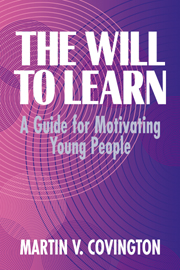Book contents
- Frontmatter
- Contents
- 1 The Future and Its Discontents
- 2 Motives as Emotions
- 3 Motives as Thoughts
- 4 Self-Worth and the Fear of Failure
- 5 The Competitive Learning Game
- 6 Motivational Equity and the Will to Learn
- 7 Strategic Thinking and the Will to Learn
- 8 An Immodest Proposal
- 9 Obstacles to Change: The Myths of Competition
- Epilogue
- Appendixes
- References
- Author Index
- Subject Index
6 - Motivational Equity and the Will to Learn
Published online by Cambridge University Press: 31 January 2011
- Frontmatter
- Contents
- 1 The Future and Its Discontents
- 2 Motives as Emotions
- 3 Motives as Thoughts
- 4 Self-Worth and the Fear of Failure
- 5 The Competitive Learning Game
- 6 Motivational Equity and the Will to Learn
- 7 Strategic Thinking and the Will to Learn
- 8 An Immodest Proposal
- 9 Obstacles to Change: The Myths of Competition
- Epilogue
- Appendixes
- References
- Author Index
- Subject Index
Summary
Be happy in your work.
Colonel SituIt was inevitable that Colonel Situ's advice (in Pierre Boulle's The Bridge over the River Kwai) would fail to move the British prisoners under his control. After all, the work in question involved building a railroad bridge that would advance Japan's cause in World War II, and to comply – happily or not – would mean collaborating with the enemy. As a result, Situ had few motivational cards to play. Yet he needed British help. At first Situ sought to persuade the prisoners by increasing their food ration. Then later, when these positive inducements failed, Situ applied the principle of negative reinforcement. By resuming work the prisoners could escape brutal beatings. Still British cooperation was only halfhearted and punctuated by numerous acts of sabotage.
Situ's frustration compellingly illustrates what we already know about achievement dynamics: the quality of one's effort, whether it be enthusiastic engagement, timid reluctance, or active resistance, depends largely on the reasons for performing. Clearly, defiance and anger are a poor basis on which to build anything, not bridges, and certainly not the future.
In the first five chapters we explored the consequences of using competition as a means to motivate students, thanks to the perspective provided by drive theory. In essence, we learned that competition arouses short-sighted, divisive reasons to learn, namely, to win over others and, when necessary, to avoid losing.
- Type
- Chapter
- Information
- The Will to LearnA Guide for Motivating Young People, pp. 134 - 166Publisher: Cambridge University PressPrint publication year: 1997



